中考知识要点简记归纳之八年级英语笔记整理
英语8年级笔记

英语8年级笔记
以下是八年级英语的一些重要知识点和笔记:
1. 语法重点:过去进行时态(Past Continuous Tense)。
这个时态主要用来描述在过去某个时间点正在发生的动作。
基本结构是“was/were + 动词ing”。
2. 词汇重点:掌握一些常用的动词短语,如“turn on/off”、“take off”、“put on”等,以及一些常用的形容词短语,如“asleep”、“awake”等。
3. 语言点:学习如何使用副词来描述动作的方式,如“slowly”、“quickly”等。
同时,还要学习如何使用连词来连接两个句子,如“and”、“but”、“or”等。
4. 写作练习:练习写简单的段落,包括主题句、支持句和结论句。
同时,学习如何使用过渡词来使文章更加流畅。
5. 听力和口语练习:通过听英语歌曲、看电影等方式来提高听力和口语能力,同时学习一些常用的口语表达方式。
6. 阅读理解:通过阅读英文文章来提高阅读理解能力,同时学习一些阅读技巧,如预测文章内容、寻找主题句等。
7. 文化知识:了解一些英语国家的文化背景和习俗,如节日、饮食、礼仪等,有助于更好地理解和运用英语。
以上是八年级英语的一些重点知识点和笔记,希望能对你有所帮助。
初二英语全部知识点归纳

初二英语全部知识点归纳一、词汇和语法知识点1. 时态:一般现在时、一般过去时、一般将来时、现在进行时、过去进行时、过去完成时等。
2. 介词:表示位置关系(in, on, at);表示时间关系(at, on, in, before, after)等。
3. 冠词:不定冠词(a, an)、定冠词(the)等。
4. 数词:基数词和序数词的用法。
5. 名词:可数名词和不可数名词的区别及用法;名词所有格的构成等。
6. 代词:人称代词、物主代词、指示代词、不定代词等。
7. 形容词:形容词的基本用法及比较级、最高级的构成等。
8. 副词:副词的基本用法及比较级、最高级的构成等。
9. 动词:动词的变化规则、情态动词的用法等。
10. 句型:陈述句、疑问句、祈使句、感叹句、条件句等。
11. 从句:定语从句、宾语从句、表语从句、状语从句等。
二、阅读理解知识点1. 阅读技巧:理解主题、根据上下文猜测词义、抓住关键信息等。
2. 主旨大意:根据文章的首句和尾句,了解文章的中心思想。
3. 推理判断:通过文章中的细节推断,对文中的事实进行判断。
4. 细节理解:理解文章细节,包括信息的明示和暗示、细节的排序和归类等。
5. 逻辑推理:根据文章中的信息,分析作者的观点和态度。
6. 指代理解:理解文章中代词、指示词的指代关系。
7. 文章结构:了解文章各部分之间的逻辑关系,如因果关系、转折关系等。
三、写作知识点1. 作文结构:开头(引入话题、提出主题)、主体(论证观点、给出例子、做出解释)、结尾(总结观点、给出建议)。
2. 写作技巧:使用恰当的连接词、使用合理的句子结构、选择恰当的词汇表达等。
3. 句式变换:改变句子的主动语态、被动语态、复合句的变换等。
4. 书信写作:了解书信的格式和写作要求,包括称呼、结尾、语气等。
5. 日记写作:写作日记时候应注意语言简洁明了,情感真实,时态正确等。
四、听力知识点1. 听懂对话和短文:理解对话中的信息和短文的主旨。
八年级英语语法知识点归纳总结
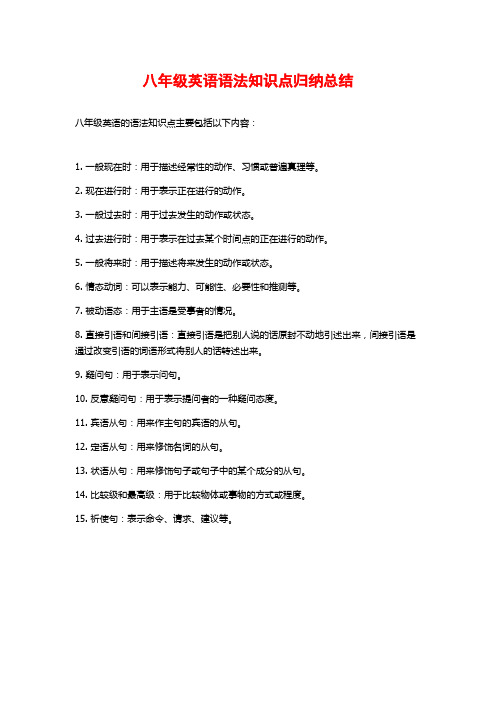
八年级英语语法知识点归纳总结
八年级英语的语法知识点主要包括以下内容:
1. 一般现在时:用于描述经常性的动作、习惯或普遍真理等。
2. 现在进行时:用于表示正在进行的动作。
3. 一般过去时:用于过去发生的动作或状态。
4. 过去进行时:用于表示在过去某个时间点的正在进行的动作。
5. 一般将来时:用于描述将来发生的动作或状态。
6. 情态动词:可以表示能力、可能性、必要性和推测等。
7. 被动语态:用于主语是受事者的情况。
8. 直接引语和间接引语:直接引语是把别人说的话原封不动地引述出来,间接引语是通过改变引语的词语形式将别人的话转述出来。
9. 疑问句:用于表示问句。
10. 反意疑问句:用于表示提问者的一种疑问态度。
11. 宾语从句:用来作主句的宾语的从句。
12. 定语从句:用来修饰名词的从句。
13. 状语从句:用来修饰句子或句子中的某个成分的从句。
14. 比较级和最高级:用于比较物体或事物的方式或程度。
15. 祈使句:表示命令、请求、建议等。
初二英语重点知识归纳

初二英语重点知识归纳初二英语作为初中英语学习的重要阶段,不仅巩固了初一的基础,还为初三的英语学习打下了坚实的基础。
在这个阶段,学生们需要掌握一些重点知识,包括语法、词汇、句型和阅读理解等。
以下是初二英语的重点知识归纳:1. 词汇积累:词汇是英语学习的基础,初二学生应该掌握更多的词汇,包括日常生活、学校生活、文化习俗等方面的词汇。
此外,学生还应该学会如何通过词根、词缀等方法来记忆和理解新词汇。
2. 语法知识:初二英语的语法知识包括但不限于时态、语态、非谓语动词、从句等。
学生需要理解并熟练运用各种时态,如一般现在时、一般过去时、一般将来时等,以及它们的被动语态形式。
同时,掌握非谓语动词的用法,如动名词、分词和不定式,以及它们在句子中的作用。
3. 句型结构:掌握各种基本句型,如主谓宾结构、主系表结构、主谓结构等,是提高英语表达能力的关键。
学生应该能够灵活运用这些句型来构建复杂的句子,表达更丰富的内容。
4. 阅读理解:提高阅读理解能力是初二英语学习的重要目标。
学生应该通过阅读各种类型的文本,如故事、说明文、议论文等,来提高自己的阅读速度和理解能力。
同时,学会运用上下文线索、词汇推断等技巧来理解文章的深层含义。
5. 写作技巧:初二学生应该开始练习写作,包括记叙文、说明文和议论文等。
在写作过程中,学生需要学会如何组织文章结构,使用恰当的连接词,以及如何表达自己的观点和看法。
6. 听力训练:听力是英语学习的重要组成部分。
学生应该通过听英语歌曲、看英语电影、听英语广播等方式来提高自己的听力水平。
同时,也可以通过做听力练习题来检验自己的听力理解能力。
7. 口语表达:口语能力的提高需要大量的实践。
学生应该抓住每一个机会来练习口语,如参加英语角、和同学进行英语对话等。
在口语表达中,注意语音、语调和流利度,以及如何组织语言来表达自己的想法。
8. 学习策略:掌握有效的学习策略对于提高英语学习效率至关重要。
学生应该学会如何制定学习计划,如何进行自我评估和自我调整,以及如何利用各种资源来辅助学习。
初二英语重点知识点梳理
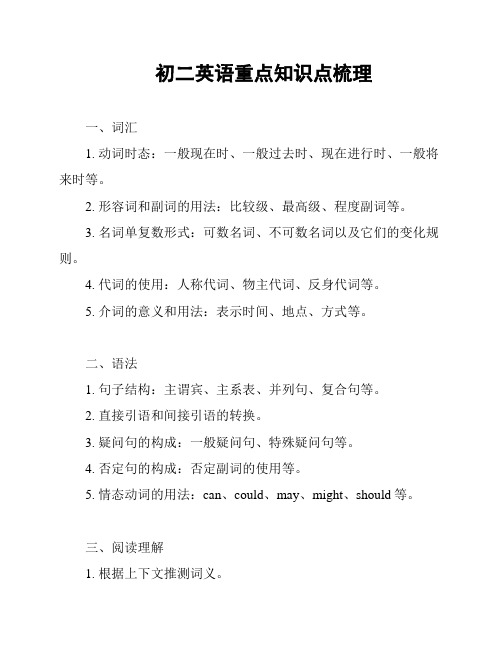
初二英语重点知识点梳理
一、词汇
1. 动词时态:一般现在时、一般过去时、现在进行时、一般将来时等。
2. 形容词和副词的用法:比较级、最高级、程度副词等。
3. 名词单复数形式:可数名词、不可数名词以及它们的变化规则。
4. 代词的使用:人称代词、物主代词、反身代词等。
5. 介词的意义和用法:表示时间、地点、方式等。
二、语法
1. 句子结构:主谓宾、主系表、并列句、复合句等。
2. 直接引语和间接引语的转换。
3. 疑问句的构成:一般疑问句、特殊疑问句等。
4. 否定句的构成:否定副词的使用等。
5. 情态动词的用法:can、could、may、might、should等。
三、阅读理解
1. 根据上下文推测词义。
2. 根据文章内容回答问题。
3. 阅读短文选取正确答案。
4. 阅读短文填空。
四、写作技巧
1. 写作格式:书信、日记、应用文等。
2. 写作内容:自我介绍、描述人物、事件、旅行经历等。
3. 句型转换:改写句子时注意语法和意思要保持一致。
4. 语言表达:使用恰当的词汇和句式进行表达。
以上是初二英语的重点知识点梳理,掌握了这些知识,能够帮助你更好地理解和使用英语,提高你的研究效果和应试能力。
初二英语知识点梳理
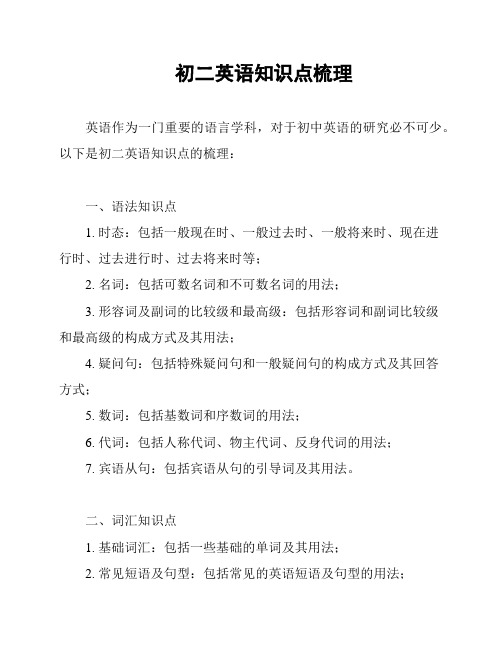
初二英语知识点梳理
英语作为一门重要的语言学科,对于初中英语的研究必不可少。
以下是初二英语知识点的梳理:
一、语法知识点
1. 时态:包括一般现在时、一般过去时、一般将来时、现在进
行时、过去进行时、过去将来时等;
2. 名词:包括可数名词和不可数名词的用法;
3. 形容词及副词的比较级和最高级:包括形容词和副词比较级
和最高级的构成方式及其用法;
4. 疑问句:包括特殊疑问句和一般疑问句的构成方式及其回答
方式;
5. 数词:包括基数词和序数词的用法;
6. 代词:包括人称代词、物主代词、反身代词的用法;
7. 宾语从句:包括宾语从句的引导词及其用法。
二、词汇知识点
1. 基础词汇:包括一些基础的单词及其用法;
2. 常见短语及句型:包括常见的英语短语及句型的用法;
3. 语法词汇:包括连接词(and、but、or等)及其用法;
4. 固定搭配:包括一些固定的词语搭配及其用法。
三、阅读技巧
1. 快速阅读:包括扫读和略读的技巧;
2. 细节理解:包括寻找细节信息的技巧;
3. 推理判断:包括通过推理判断获得更多信息的技巧;
4. 阅读策略:包括提前预测、注意关键词汇、记笔记等阅读策略。
以上是初二英语知识点的梳理,希望能够帮助到大家,提高自己的英语学习水平。
八年级全册英语归纳总结知识点

八年级全册英语归纳总结知识点During the eighth grade, students learn a wide range of English language skills and knowledge. This article aims to provide a comprehensive summary of the key points covered in the eighth-grade English curriculum.1. Grammar1. Verb Tenses:- Present Simple: used for facts, habits, and general truths.- Present Continuous: used for actions happening at the moment of speaking.- Past Simple: used for completed actions in the past.- Past Continuous: used for actions in progress at a specific time in the past.- Future Simple: used for future plans and predictions.2. Parts of Speech:- Nouns: refer to people, places, things, or ideas.- Pronouns: replace nouns in sentences.- Verbs: express actions or states of being.- Adjectives: describe or modify nouns.- Adverbs: modify verbs, adjectives, or other adverbs.- Prepositions: indicate relationships between words.- Conjunctions: connect words or groups of words.- Interjections: express strong emotions.3. Sentence Structure:- Subject-Verb Agreement: ensuring the subject and verb agree in number.- Sentence Types: declarative, interrogative, imperative, and exclamatory.- Direct and Indirect Speech: reporting speech using proper punctuation and tense changes.- Conditional Sentences: expressing hypothetical situations.4. Active and Passive Voice: understanding the difference and transforming sentences between the two forms.5. Reported Speech: reporting what someone else said in writing or speaking.2. Vocabulary1. Word Formation: understanding prefixes, suffixes, and roots to determine the meanings of unfamiliar words.2. Synonyms and Antonyms: learning words with similar or opposite meanings.3. Idioms and Phrasal Verbs: familiarizing oneself with common expressions and their meanings.4. Collocations: understanding combinations of words that frequently occur together.5. Contextual Vocabulary: deducing word meanings from the surrounding text.3. Reading Comprehension1. Skimming: quickly reading to get a general understanding of the text.2. Scanning: rapidly locating specific information in a text.3. Inference: drawing conclusions based on the information provided.4. Main Idea and Supporting Details: identifying the central theme and related information in a text.5. Text Structure: recognizing the organization of a text (i.e., chronological, cause-effect, problem-solution).4. Writing Skills1. Paragraph Writing: structuring clear and coherent paragraphs.2. Narrative Writing: telling a story with proper sequence and descriptive details.3. Descriptive Writing: using vivid language to describe people, places, or objects.4. Persuasive Writing: expressing opinions, supporting arguments, and convincing others.5. Letter Writing: understanding the format and tone for writing formal and informal letters.5. Speaking and Listening1. Oral Presentations: delivering informative speeches to the class.2. Group Discussions: exchanging ideas and opinions in a collaborative setting.3. Active Listening: using attentive and responsive listening techniques.4. Pronunciation: practicing correct pronunciation of words and phrases.5. Presentation Skills: using appropriate body language, eye contact, and vocal expression.6. Culture and Literature1. Exploring literary genres: novels, short stories, poetry, and plays.2. Studying authors: understanding the lives and works of famous authors.3. Cultural Practices: gaining insights into different cultures and traditions through literature.In conclusion, the eighth-grade English curriculum encompasses a wide range of grammar, vocabulary, reading, writing, speaking, and listening skills. Mastering these knowledge points will help students develop strong English language abilities and effectively communicate in both written and spoken forms.。
八年级英语必考知识点总汇

八年级英语必考知识点总汇在八年级英语中,有一些必考的知识点,这些知识点可能会在期末考试和中考中出现。
今天,我们来总结一下这些英语必考知识点,帮助你更好地备考。
一、语法知识点1. 时态:要掌握英语的基本时态,包括一般现在时、一般过去时、现在进行时、过去进行时、将来时等。
此外还要掌握时态的被动语态和进行时态。
2. 名词:英语中有很多名词,要掌握它们的复数形式、所有格和可数与不可数。
3. 形容词和副词:彻底掌握形容词和副词的用法和比较级、最高级等。
4. 介词:介词在英语中扮演着重要的角色,要掌握它们的用法和搭配。
5. 连词:学习不同的连词,包括并列连词、递进连词、转折连词等,了解它们的用法。
二、词汇知识点1. 常用单词:要掌握英语的常用词汇,包括表示时间、颜色、数字、排列顺序、方位等的词汇。
2. 短语和动词搭配:学习一些常用短语和常用的动词搭配,包括与动词搭配的介词等。
3. 同义词和反义词:了解一些单词的同义词和反义词,加强英语的词汇量。
三、阅读知识点1. 阅读理解:阅读理解是英语考试中的重点,要加强练习。
要注意不同类型的阅读材料,包括新闻报道、广告、说明书等。
2. 理解文章主旨:在阅读理解中,有时候需要理解文章的主旨和中心思想,要加强文章理解能力。
四、听力知识点1. 单词和短语的听音:要加强对常用单词和短语的听力理解,提高听力水平。
2. 听力理解:加强对英语口语的听力理解,提高听力和口语能力。
五、写作知识点1. 语法和拼写:写作中要注意语法和拼写错误,加强对语法和词汇的掌握。
2. 文章结构:学习一些常用的文章结构,包括叙述、描写、说明、议论等。
六、口语知识点1. 常用口语:掌握一些常用的口语表达方式,包括问候、道歉、介绍、感谢等。
2. 句子的构造:加强对英语句子的构造和语法规则的掌握,提高口语表达能力。
总之,在八年级英语备考过程中,要注重练习,加强对语法、词汇和阅读理解的掌握,提高听力和口语水平,从而取得好成绩。
八年级英语知识点汇总
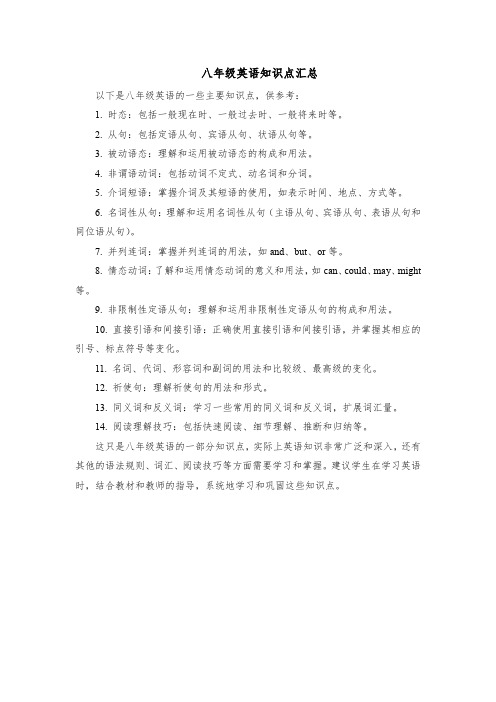
八年级英语知识点汇总
以下是八年级英语的一些主要知识点,供参考:
1. 时态:包括一般现在时、一般过去时、一般将来时等。
2. 从句:包括定语从句、宾语从句、状语从句等。
3. 被动语态:理解和运用被动语态的构成和用法。
4. 非谓语动词:包括动词不定式、动名词和分词。
5. 介词短语:掌握介词及其短语的使用,如表示时间、地点、方式等。
6. 名词性从句:理解和运用名词性从句(主语从句、宾语从句、表语从句和同位语从句)。
7. 并列连词:掌握并列连词的用法,如and、but、or等。
8. 情态动词:了解和运用情态动词的意义和用法,如can、could、may、might 等。
9. 非限制性定语从句:理解和运用非限制性定语从句的构成和用法。
10. 直接引语和间接引语:正确使用直接引语和间接引语,并掌握其相应的引号、标点符号等变化。
11. 名词、代词、形容词和副词的用法和比较级、最高级的变化。
12. 祈使句:理解祈使句的用法和形式。
13. 同义词和反义词:学习一些常用的同义词和反义词,扩展词汇量。
14. 阅读理解技巧:包括快速阅读、细节理解、推断和归纳等。
这只是八年级英语的一部分知识点,实际上英语知识非常广泛和深入,还有其他的语法规则、词汇、阅读技巧等方面需要学习和掌握。
建议学生在学习英语时,结合教材和教师的指导,系统地学习和巩固这些知识点。
八年级英语必考知识点汇总
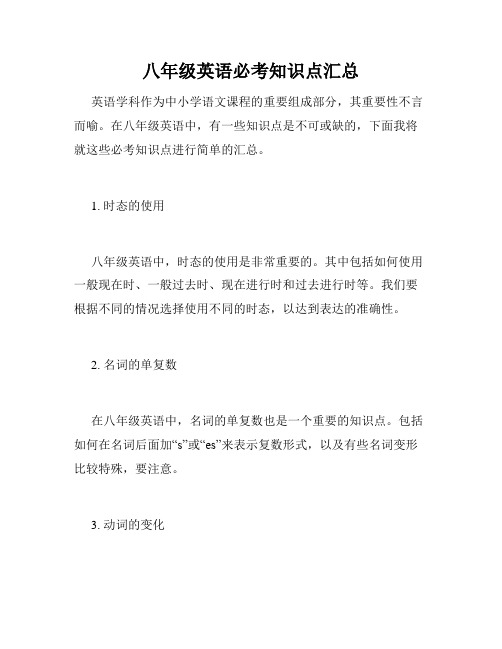
八年级英语必考知识点汇总英语学科作为中小学语文课程的重要组成部分,其重要性不言而喻。
在八年级英语中,有一些知识点是不可或缺的,下面我将就这些必考知识点进行简单的汇总。
1. 时态的使用八年级英语中,时态的使用是非常重要的。
其中包括如何使用一般现在时、一般过去时、现在进行时和过去进行时等。
我们要根据不同的情况选择使用不同的时态,以达到表达的准确性。
2. 名词的单复数在八年级英语中,名词的单复数也是一个重要的知识点。
包括如何在名词后面加“s”或“es”来表示复数形式,以及有些名词变形比较特殊,要注意。
3. 动词的变化动词的变化包括主语动词一致性、不规则动词的使用、动词的时态和语态等。
这些知识点在八年级的英语学习中也是非常重要的。
4. 代词的使用在八年级英语学习中,代词的使用也是一项非常重要的知识点。
我们要正确使用一些常用的代词,如人称代词、反身代词、指示代词和不定代词等。
5. 语法结构的应用在八年级英语中,语法结构的应用也是一个很重要的知识点。
常见的应用包括比较级和最高级、虚拟语气等。
我们需要掌握这些语法结构,并在语言表达中灵活运用。
6. 短语和词组的应用在英语中,短语和词组的应用也是非常重要的。
尤其是一些常用的短语和词组,如动词短语、介词短语和固定搭配等。
我们需要学习这些短语和词组,并在语言表达中加以运用。
7. 名词性从句和定语从句的使用在八年级英语中,名词性从句和定语从句的使用也是一个不可或缺的知识点。
名词性从句可以用作主语、宾语和表语,并且我们需要掌握如何正确使用关系代词和连接词来构造定语从句。
8. 阅读技巧八年级英语中,阅读技巧也是一个非常重要的部分。
我们需要能够正确理解文章的大意、找到文章中的关键信息,并进行分析和理解。
同时,我们还需要锻炼自己的阅读速度和阅读能力,以提高自己的英语阅读能力。
综上所述,以上这些八年级英语必考知识点都是我们必须掌握的。
我们需要通过不断地学习和练习来掌握它们,并在实际的英语交流中灵活运用。
八年级英语知识点的归纳总结

八年级英语知识点的归纳总结英语作为学生时代不可缺少的科目,有没有什么系统的方法更好的复习呢。
以下是由编辑为大家整理的“八年级英语知识点的归纳总结”,仅供参考,欢迎大家阅读。
八年级英语知识点的归纳总结Unit1 Where did you go on vacation?【重点语法】不定代词:不指名代替任何特定名词或形容词的代词叫做不定代词。
用法注意:1. some 和any +可数名/不可数名。
some 多用于肯定句,any多用于否定句、疑问句和条件从句。
有些问句中用some,不用any, 问话者希望得到对方肯定回答。
2. 由some, any, no, every 与 body, one, thing构成的复合不定代词作主语时,其谓语动词用三单。
3. 不定代词若有定语修饰,该定语要置于其后:如:something interesting【重点短语】1. buy sth for ab./ buy sb. sth 为某人买某物2. taste + adj. 尝起来……3. nothing...but + V.(原形) 除了……之外什么都没有4. seem + (to be) + adj 看起来5. arrive in + 大地方 / arrive at + 小地方到达某地6. decide to do sth. 决定做某事7. try doing sth. 尝试做某事 / try to do sth. 尽力做某事8. enjoy doing sth. 喜欢做某事9. want to do sth. 想去做某事10. start doing sth. 开始做某事=begin doing sth.11. stop doing sth. 停止做某事区分:stop to do sth. 停下来去做某事12. dislike doing sth. 不喜欢做某事14. so + adj + that + 从句如此……以至于……16. tell sb. (not) to do sth. 告诉某人(不要) 做某事17. keep doing sth. 继续做某事18. forget to do sth. 忘记去做某事 / forget doing sth 忘记做过某事【词语辨析】1. take a photo/ take photos 拍照quite a few+名词复数“许多…”2. seem + 形容词看起来…... You seem happy today.seem + to do sth. 似乎/好像做某事 I seem to have a coldIt seems + 从句似乎..…. It seems that no one believe you.seem like ... 好像,似乎….. It seems like a good idea.3. arrive in +大地点= get to= reach+地点名“到达......”arrive at +小地点(注:若后跟地点副词here/there/home, 介词需省略,如:arrive here; get home)4. feel like sth 感觉像…feel doing sth. 想要做某事5. wonder(想知道)+疑问词(who, what, why)引导的从句。
初二英语知识点归纳_八年级英语知识点汇总.doc
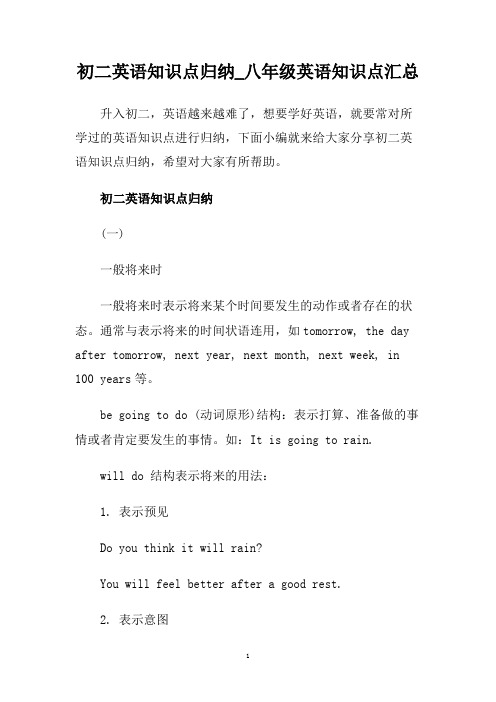
初二英语知识点归纳_八年级英语知识点汇总升入初二,英语越来越难了,想要学好英语,就要常对所学过的英语知识点进行归纳,下面小编就来给大家分享初二英语知识点归纳,希望对大家有所帮助。
初二英语知识点归纳(一)一般将来时一般将来时表示将来某个时间要发生的动作或者存在的状态。
通常与表示将来的时间状语连用,如tomorrow, the day after tomorrow, next year, next month, next week, in 100 years等。
be going to do (动词原形)结构:表示打算、准备做的事情或者肯定要发生的事情。
如:It is going to rain.will do 结构表示将来的用法:1. 表示预见Do you think it will rain?You will feel better after a good rest.2. 表示意图I will borrow a book from our school library tomorrow.What will she do tomorrow?基本构成如下:一般疑问句构成:(1)will+主语+do…? Will Sarah come to visit me next Sunday?(2)there be 结构的一般疑问句:Will there + be …?Will there be fewer trees? Yes, there will. / No, there won't否定句构成:will + not (won't)+doSarah won't come to visit me next Sunday.特殊疑问句构成:特殊疑问词+will+主语+…?What will Sarah do next Sunday?(二)should的用法:should用来提出建议和忠告,后边加动词原形,否定句直接在should后边加not.例如:I think you should eat less junk food.我认为你应该少吃垃圾食品。
初二英语知识点概括

初二英语知识点概括英语作为一门国际语言,是我们学习的重点科目之一。
在初二英语学习中,有一些核心知识点需要我们掌握和理解。
本文将对初二英语的知识点进行概括,帮助同学们更好地学习和复习。
1. 语法知识点1.1 时态在初二英语中,我们需要理解和运用一些基本的时态,如一般现在时、一般过去时、一般将来时等。
掌握这些时态的用法,可以帮助我们正确表达过去、现在和将来的动作和状态。
1.2 名词初二英语中,名词的用法也是重要的知识点之一。
我们需要了解可数名词和不可数名词的区别,掌握复数名词的变化规则,并学会使用不同的名词形式。
1.3 代词代词在英语中用来代替名词,避免重复使用。
初二英语中,我们需要学习人称代词、物主代词、指示代词等的用法,并能正确使用它们。
2. 阅读理解2.1 阅读技巧初二英语中的阅读理解是一个重要的考察点。
我们需要学会使用一些阅读技巧,如快速浏览、找关键词、理解上下文等。
这些技巧可以帮助我们更好地理解文章内容,提高阅读效率。
2.2 阅读题型在阅读理解中,还有一些常见的题型,如选择题、判断题、填空题等。
我们需要熟悉这些题型的要求,掌握解题技巧,并通过大量练习来提高解题能力。
3. 写作技巧3.1 写作结构初二英语中的写作部分通常要求我们按照一定的结构来展开文章,如三段式结构(引言、主体、结论)等。
我们需要学会构思和组织文章的结构,使之条理清晰、逻辑严密。
3.2 词汇和句型写作中的词汇和句型也是我们需要关注的知识点。
我们可以通过积累一些高级词汇和优美的句型,使文章更加生动、流畅。
4. 口语交流4.1 日常用语初二英语中的口语交流是我们学习英语的重要方面。
我们需要学会一些常用的日常用语,如问候语、道歉语、感谢语等,并能在实际生活中流利地运用。
4.2 对话练习通过对话练习,我们可以提高听力和口语能力。
我们可以找到一些对话材料,自己模仿或和同学进行对话练习,加深对语言表达的理解和运用。
5. 听力训练5.1 听力技巧初二英语中的听力部分也是需要我们重点关注的。
八年级英语必考点知识归纳

八年级英语必考点知识归纳In the eighth grade English exam, there are several key points that students must know in order to do well. These key points include grammar rules, vocabulary, reading comprehension skills, and writing techniques.Grammar rules cover a variety of topics such as verb tenses, subject-verb agreement, pronoun usage, and sentence structure. It is important for students to have a good understanding of these rules in order to correctly form sentences and communicate effectively in writing.Vocabulary is another important aspect of the exam. Students should be familiar with a wide range of words and phrases in order to understand reading passages and answer questions accurately. It is also important for students to be able to use context clues to determine the meanings of unfamiliar words.Reading comprehension skills are essential for understanding and analyzing texts. Students should be able to identify main ideas, infer meaning from context, and make connections between different parts of a text. It isalso important for students to be able to recognizeliterary devices such as similes, metaphors, and symbolism.Writing techniques are also important for the exam. Students should be able to write clear and coherent essays, using proper grammar and punctuation. They should also be able to organize their ideas logically and support their arguments with evidence and examples.Overall, the key points to focus on for the eighth grade English exam include grammar rules, vocabulary, reading comprehension skills, and writing techniques. By mastering these key points, students can improve their performance on the exam and achieve success in their English studies.八年级英语考试中有几个关键点是学生必须了解的,以便取得好成绩。
八年级常考知识点英语总结

八年级常考知识点英语总结As a student in eighth grade, there are many important knowledge points to master in English. In this article, we will summarize these key points to help students more effectively prepare for exams and achieve success in English.1. GrammarAs students progress through their English studies, grammar becomes an increasingly important component. Some key grammar concepts that are frequently tested in eighth grade include:- Subject-verb agreement- Pronoun-antecedent agreement- Sentence structure (including simple, compound, complex sentences)- Verb tenses (including past, present, and future)- Modal auxiliary verbs (such as can, could, should, must)- Articles (a, an, the)- Prepositions and prepositional phrasesTo improve your grammar skills, it's important to practice identifying and correcting errors in sentences. English grammar worksheets and quizzes can also be helpful tools for strengthening your understanding of these key concepts.2. VocabularyAnother crucial component of English is vocabulary. To do well on exams, it's important to have a strong grasp of commonly used words and phrases, as well as synonyms and antonyms. Some helpful strategies for building your vocabulary include:- Reading widely: exposure to a variety of texts can help you learn new words and see them used in context- Using flashcards: create flashcards with new words and quiz yourself regularly- Keeping a vocabulary journal: write down new words you encounter and their definitions3. Reading comprehensionReading comprehension is an essential skill for success in English exams. To improve your abilities in this area, it's important to practice reading passages and answering questions about them. Some key strategies for improving reading comprehension include:- Reading actively: engage with the text by highlighting key information, taking notes, and asking yourself questions as you read- Summarizing: after reading a passage, try to summarize the main ideas in your own words- Inferring: use clues in the text to make educated guesses about information that is not directly stated4. WritingWriting is another important component of English, and eighth grade students are often required to write essays, stories, and argumentative pieces. Some key strategies for improving your writing skills include:- Planning: take time to think about your topic and brainstorm ideas before beginning to write- Organizing: create an outline or graphic organizer to help structure your writing- Revising: once you've written a draft, go back and revise it for clarity, coherence, and logical progression of ideas- Editing: check your writing for grammar, spelling, and punctuation errors5. Speaking and ListeningFinally, speaking and listening are important skills to develop in English. Some key strategies for improving in these areas include:- Participating in class discussions: actively contribute your thoughts and ideas in group discussions and activities- Practicing pronunciation: listen carefully to how words are pronounced and practice saying them aloud- Listening actively: focus on the information being conveyed in a conversation or presentation, and ask questions to clarify your understandingBy mastering these key knowledge points, eighth grade students can achieve success in their English studies and prepare themselves for success in high school and beyond. With consistent practice and dedication, anyone can improve their English skills and achieve their goals.。
初二英语要点知识归纳总结

初二英语要点知识归纳总结期中考试即将来临,学习英语学生应在考试之前做好准备,整理好重要知识点,及时复习,调整好心态,多做一些题目。
下面是店铺分享给大家的初二英语要点知识,希望大家喜欢!初二英语语法要点知识一般将来时态的应用do/does 的一般将来时态形式:(shall/will) dodo/does 的一般将来时态的被动语态:(shall/will) be done一般将来时态的肯定句、否定句、疑问句形式:肯定句例句:People will have robots in a few years.否定句例句:People (will not/won't) have robots in a few years.一般疑问句例句:Will people have robots in a few years?特殊疑问句例句:What will people have in a few years?重点语法过去将来时一、过去将来时的结构should/would+动词原形do/does 的过去将来时态形式:(should/would) dodo/does的过去将来时态的被动语态:(should/would) be done 过去将来时态的肯定句、否定句、疑问句形式:肯定句例句:You should write a letter to him.否定句例句:You shouldn't write a letter to him.一般疑问句例句:Should I write a letter to him?特殊疑问句例句:What should I do?重点语法过去进行时do/does 的过去进行时态形式:(was/were) doingdo/does 的过去进行时态的被动语态:(was/were) being done过去将来时态的肯定句、否定句和疑问句形式:肯定句例句:I was walking down the street when a UFO landed.否定句例句:I wasn't walking down the street when a UFO landed.一般疑问句例句:Were you walking down the street when a UFO landed?特殊疑问句例句:What were you doing when a UFO landed?动词 when 和 while 的选择:when 后加瞬间动词,while 后加延续性动词。
初二英语重点知识归纳整理

初二英语重点知识归纳整理1一般将来时应用do/does 的一般将来时态形式:(shall/will) dodo/does 的一般将来时态的被动语态:(shall/will) be done过去将来时should/would+动词原形do/does 的过去将来时态形式:(should/would) dodo/does的过去将来时态的被动语态:(should/would) be done 过去进行时do/does 的过去进行时态形式:(was/were) doingdo/does 的过去进行时态的被动语态:(was/were) being done 21. You should speak English in class.2. You should write down your mistakes in your notebooks.3. Why don’t you write down the correct spelling an d grammar next to the mistakes?4. How about listening to the radio or reading a newspaper in English?5. Try not to translate every word.6. Everyone should have a pen friend and write email messages to each other.7. It’s a good idea to check your vocabulary notebook every day.31) 单数名词加s: students, apples, bags, trees, books, brothers.2) 以s、x、sh、ch结尾的名词加es: glasses, boxes, brushes, matches.3) 以辅音字母加y结尾的名词,变y为i加es: cities, babies,enemies.4) 以f或fe结尾的名词,多数变f为v加es: wives, knives.但有些词只加s: roofs,proofs, chiefs.5) 以o结尾的名词,有些加es: Negroes, heroes, tomatoes, potatoes. 其它加s: radio s, zoos, pianos, photos.6) 不规则名词:foot→feet, goose→geese, tooth→teeth, child→children, man→men, woman→women, mouse→mice.7) 单复数同形的名词:sheep,fish,dee.4忽略as 和which 引导非限定性定语从句的区别。
- 1、下载文档前请自行甄别文档内容的完整性,平台不提供额外的编辑、内容补充、找答案等附加服务。
- 2、"仅部分预览"的文档,不可在线预览部分如存在完整性等问题,可反馈申请退款(可完整预览的文档不适用该条件!)。
- 3、如文档侵犯您的权益,请联系客服反馈,我们会尽快为您处理(人工客服工作时间:9:00-18:30)。
八年级英语笔记整理
Unit 1 How often do you exercise?
谈论通常做的事情谈论做事的频率
-----what du you usually du on weekends? -----how often do you eat vegetables? -----I sometimes go to the beach. ------Every day.
重点短语:
How often 多久一次eating habit 饮食习惯
Junk food 垃圾食品as for 至于;关于
a lot of 大量;许多of course 当然;自然
look after 照看;照顾how many 多少
语法:一般现在时
1.一般现在时的谓语动词主要用动词原形表示,但如果主语是第三人称单数,则谓语动词
也要变为第三人称单数。
另外,be 动词和have 有特殊的人称形式。
2.一般现在时的用法。
(1. )表示经常发生的动作或存在的状态。
常和always ,usually,often, sometimes, every day, 等时间状语连用。
例如:he is often late for meeting. 他常常开会迟到。
(2. )表示客观真理。
由于是众所周知的客观事实,所以一般不用时间状语。
例如;the earth moves around the sun. 地球绕着太阳转。
(3)有些表示心理状态和感觉的动词往往用于到一般现在时中。
例如:I want tu see you. 我想去看你。
思维拓展:
1 、how often 通常用来询问动作发生的频率,回答一般是once (一次),twice (两次),three times a day (一天三次)sometimes (有时),never (从不),often (经常)等。
how long 主要用来对时间的长短提问或者询问物体的长度,回答一般是:two days/weeks/months/years( 两天/ 周/ 月/ 年) 。
how much 用来提问不可数名词数量的多
少或对价格提问。
How many 对可数名词的数量的多少提问。
2、与go 有关的短语:go to the movies 去看电影
go out 熄灭go over 仔细查看
go to school 去上学go home 回家
3 关于几种“看”的区别
Look at---- 表示看的动作,不强调结果。
例如:please look at the blackboard. 请看黑板。
See---- 表示“看见”强调结果。
Watch---- 意为“观看”,强调娱乐性,观赏性,一般用于看电视,看节目,比赛等活动、。
4、有关次数的表达:two or three times 两三次two to three times 两至三次
5、(1)sometimes “有时候”,表示动作发生频率的副词。
(2)some times “几次”,表示动作发生的次数。
(3)sometime 的意思是“某时,曾经”。
(4)some time 的意思是“一段时间”。
6、(1)every day “每天”。
Everyday “日常的”。
7、几种“说”区别
say 强调说内容,所说的话在句子中常用引号引起来。
talk —指谈论,后面常接about 或者with. Tell---- 意为告诉,后面可接不定式,即tell sb to do sth. “让某人干某事”。
